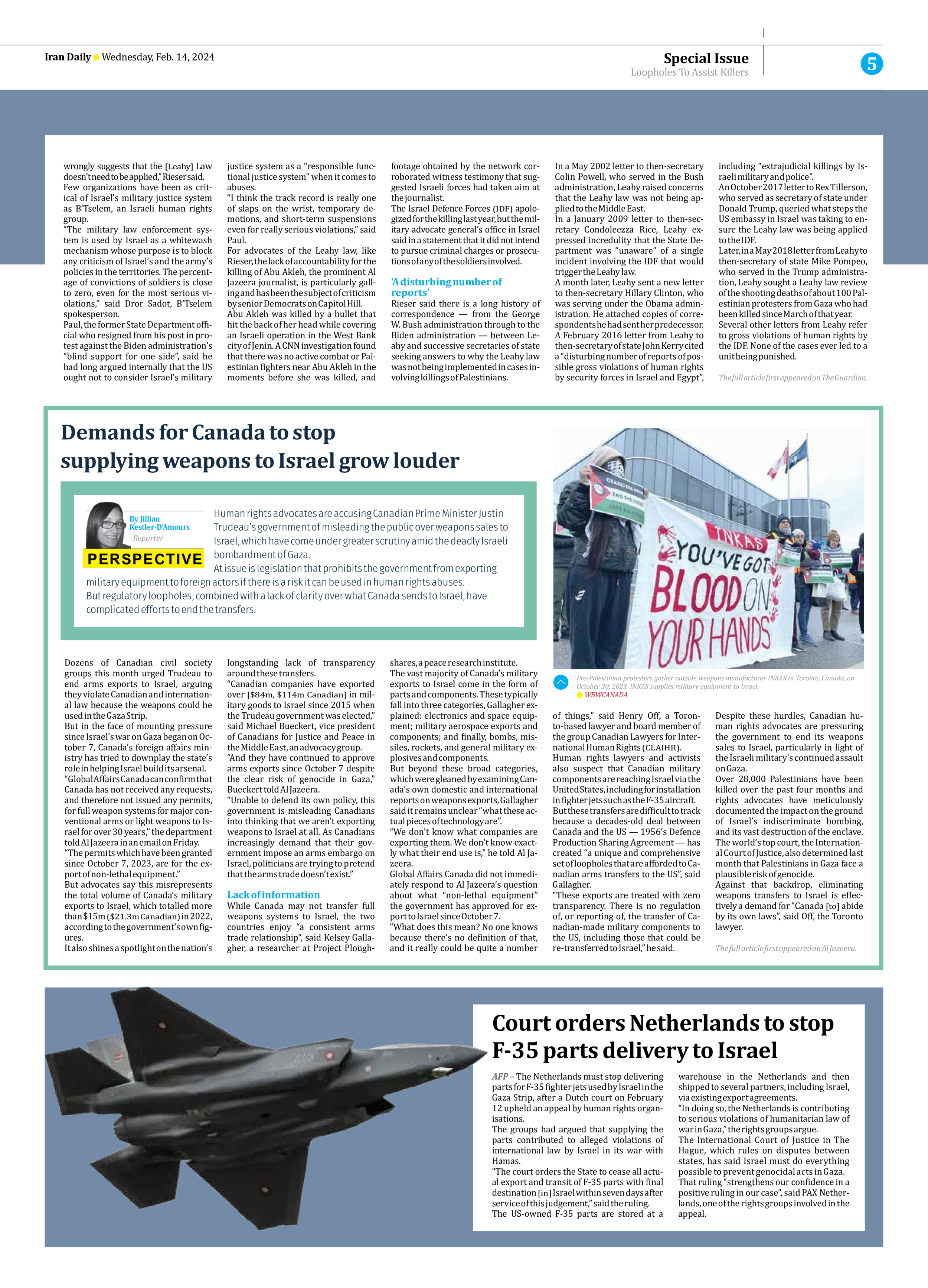
Demands for Canada to stop supplying weapons to Israel grow louder
By Jillian Kestler-D’Amours
Reporter
Human rights advocates are accusing Canadian Prime Minister Justin Trudeau’s government of misleading the public over weapons sales to Israel, which have come under greater scrutiny amid the deadly Israeli bombardment of Gaza.
At issue is legislation that prohibits the government from exporting military equipment to foreign actors if there is a risk it can be used in human rights abuses.
But regulatory loopholes, combined with a lack of clarity over what Canada sends to Israel, have complicated efforts to end the transfers.
Dozens of Canadian civil society groups this month urged Trudeau to end arms exports to Israel, arguing they violate Canadian and international law because the weapons could be used in the Gaza Strip.
But in the face of mounting pressure since Israel’s war on Gaza began on October 7, Canada’s foreign affairs ministry has tried to downplay the state’s role in helping Israel build its arsenal.
“Global Affairs Canada can confirm that Canada has not received any requests, and therefore not issued any permits, for full weapon systems for major conventional arms or light weapons to Israel for over 30 years,” the department told Al Jazeera in an email on Friday.
“The permits which have been granted since October 7, 2023, are for the export of non-lethal equipment.”
But advocates say this misrepresents the total volume of Canada’s military exports to Israel, which totalled more than $15m ($21.3m Canadian) in 2022, according to the government’s own figures.
It also shines a spotlight on the nation’s longstanding lack of transparency around these transfers.
“Canadian companies have exported over [$84m, $114m Canadian] in military goods to Israel since 2015 when the Trudeau government was elected,” said Michael Bueckert, vice president of Canadians for Justice and Peace in the Middle East, an advocacy group.
“And they have continued to approve arms exports since October 7 despite the clear risk of genocide in Gaza,” Bueckert told Al Jazeera.
“Unable to defend its own policy, this government is misleading Canadians into thinking that we aren’t exporting weapons to Israel at all. As Canadians increasingly demand that their government impose an arms embargo on Israel, politicians are trying to pretend that the arms trade doesn’t exist.”
Lack of information
While Canada may not transfer full weapons systems to Israel, the two countries enjoy “a consistent arms trade relationship”, said Kelsey Gallagher, a researcher at Project Ploughshares, a peace research institute.
The vast majority of Canada’s military exports to Israel come in the form of parts and components. These typically fall into three categories, Gallagher explained: electronics and space equipment; military aerospace exports and components; and finally, bombs, missiles, rockets, and general military explosives and components.
But beyond these broad categories, which were gleaned by examining Canada’s own domestic and international reports on weapons exports, Gallagher said it remains unclear “what these actual pieces of technology are”.
“We don’t know what companies are exporting them. We don’t know exactly what their end use is,” he told Al Jazeera.
Global Affairs Canada did not immediately respond to Al Jazeera’s question about what “non-lethal equipment” the government has approved for export to Israel since October 7.
“What does this mean? No one knows because there’s no definition of that, and it really could be quite a number of things,” said Henry Off, a Toronto-based lawyer and board member of the group Canadian Lawyers for International Human Rights (CLAIHR).
Human rights lawyers and activists also suspect that Canadian military components are reaching Israel via the United States, including for installation in fighter jets such as the F-35 aircraft.
But these transfers are difficult to track because a decades-old deal between Canada and the US — 1956’s Defence Production Sharing Agreement — has created “a unique and comprehensive set of loopholes that are afforded to Canadian arms transfers to the US”, said Gallagher.
“These exports are treated with zero transparency. There is no regulation of, or reporting of, the transfer of Canadian-made military components to the US, including those that could be re-transferred to Israel,” he said.
Despite these hurdles, Canadian human rights advocates are pressuring the government to end its weapons sales to Israel, particularly in light of the Israeli military’s continued assault on Gaza.
Over 28,000 Palestinians have been killed over the past four months and rights advocates have meticulously documented the impact on the ground of Israel’s indiscriminate bombing, and its vast destruction of the enclave. The world’s top court, the International Court of Justice, also determined last month that Palestinians in Gaza face a plausible risk of genocide.
Against that backdrop, eliminating weapons transfers to Israel is effectively a demand for “Canada [to] abide by its own laws”, said Off, the Toronto lawyer.
The full article first appeared on Al Jazeera.







